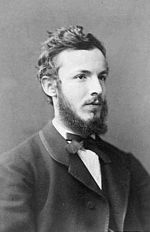JFM 48.0199.02 Mostowski, Andrzej (1938), "Über den Begriff einer Endlichen Menge", Comptes Rendus des Séances de la Société des Sciences et des Lettres de...
3 KB (370 words) - 13:37, 19 September 2024
in mathematics at the end of the 19th century. The German word for set, Menge, was coined by Bernard Bolzano in his work Paradoxes of the Infinite. Georg...
42 KB (4,813 words) - 17:04, 3 January 2025
this I conclude that under certain circumstances a definable collection [Menge] does not form a totality. Russell would go on to cover it at length in...
31 KB (4,605 words) - 05:05, 3 January 2025
third person plural pronouns. Reflexivity is expressed by the words mengɛ or mengɛ tɔr in singular and menne or menne tɔr in plural after any personal...
31 KB (2,907 words) - 11:15, 14 August 2024
of the root. The prefix mêngê- is used before monosyllabic roots, although some roots like tahu "to know" seems to have mêngê- on the form mêngêtahui...
35 KB (3,535 words) - 09:19, 3 January 2025
ISBN 0-486-48841-1. Mostowski, Andrzej (1938), "Über den Begriff einer Endlichen Menge", Comptes Rendus des Séances de la Société des Sciences et des Lettres de...
58 KB (7,745 words) - 18:27, 30 December 2024
article Beiträge zur Begründung der transfiniten Mengenlehre: Unter einer 'Menge' verstehen wir jede Zusammenfassung M von bestimmten wohlunterschiedenen...
34 KB (4,715 words) - 11:25, 21 September 2024
Monosyllabic verbs add an epenthetic vowel before prefixing and produce the prefix menge-: bor (= boring tool / drill) → mengebor (= to make a hole with drill)....
37 KB (2,589 words) - 22:00, 3 December 2024
{\mathfrak {M}}(A)} for " A {\displaystyle A} is a set" (in German, "set" is Menge). He also introduced axioms stating that every set is a class and that if...
97 KB (15,661 words) - 23:21, 21 November 2024
das Kontinuum also identisch mit der Menge aller algebraischen Zahlen. Das ist aber unmöglich, weil die Menge aller algebraischen Zahlen abzählbar ist...
102 KB (7,563 words) - 16:07, 11 November 2024
location missing publisher (link) Zermelo, Ernst (1904). "Beweis, daß jede Menge wohlgeordnet werden kann". Mathematische Annalen (in German). 59 (4): 514–516...
69 KB (8,343 words) - 01:23, 24 December 2024




